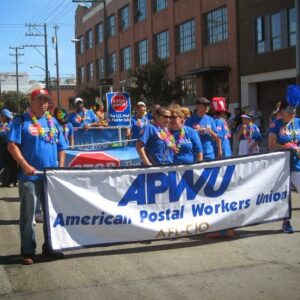December 15, 2010
APWU, USPS Announce Freeze on Excessing
Parties Agree to Moratorium as Talks Continue
The APWU and the Postal Service have agreed to a freeze on excessing while contract negotiations continue, union President Cliff Guffey has announced. “Throughout the bargaining process, the APWU has sought to negotiate a contract that would protect jobs and lessen the pain of excessing for our members. We are pursuing those goals,” he said.
“In the meantime, the moratorium on excessing is a demonstration of good faith that will make the holidays a lot brighter for many of our members,” Guffey said. “The freeze will remain in effect as long as bargaining continues,  and will apply to excessing outside of a craft or installation.”
and will apply to excessing outside of a craft or installation.”
Such excessing was imminent in hundreds of locations, and would have affected thousands of employees. The excessing will be halted at all sites while bargaining goes on, the union president said.
“Union negotiators will persevere in our efforts to negotiate a collective bargaining agreement that meets our long-term goals,” Guffey added. “We have been working diligently to reach an agreement that will benefit postal workers and the Postal Service. We will continue our efforts until we reach a settlement – or it becomes clear that an agreement cannot be reached. If we conclude that a contract is not within our grasp, we are prepared to proceed to arbitration.
“One of our top priorities is to restore work that has been contracted out or assigned to supervisory personnel. This would bring stability to APWU members who have suffered severe hardships due to long-distance reassignments caused by excessing,” he said.
“The proposals we have submitted to achieve this objective also would benefit the Postal Service,” Guffey said. “Our proposals would save the USPS money, because our members can perform these duties more efficiently and less expensively.”
In addition to job security and alleviating the pain of excessing, the parties are discussing wages, benefits and issues related to workforce structure.
Mediation, Arbitration
The contract was originally scheduled to expire Nov. 20, but the union and management extended the deadline. The 2006-2010 Collective Bargaining Agreement will remain in effect until a new agreement is reached through negotiation, mediation, or arbitration.
Under the terms of the Postal Reorganization Act of 1970, if the union and management fail to reach agreement on a successor contract and do not agree on an alternate procedure, the Federal Mediation and Conciliation Service (FMCS) appoints a mediator. If a settlement is not reached within 60 days of the expiration of the contract, both parties submit all outstanding issues to binding arbitration.
If arbitration becomes necessary, the APWU will appoint an arbitrator, as will the USPS. The two party-appointed arbitrators will work with a neutral arbitrator to ensure that each side’s interests are clearly understood.
“The APWU will continue our efforts to negotiate a contract that benefits postal workers and the Postal Service,” Guffey said. “I ask union members for their continued support as this process unfolds.”
The APWU will continue to provide frequent updates regarding the status of collective bargaining. For the latest developments, please visit www.apwu.org. Members are also encouraged to follow the union on Twitter and Facebook to receive up-to-the-minute alerts by e-mail or text message.


